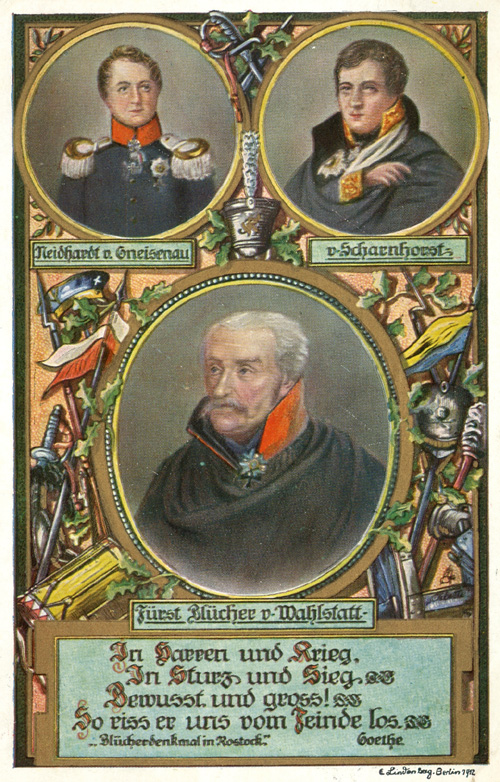Gneisenau, Scharnhorst und Blücher
The commander of the Prussian army in Flanders, Field Marshal (Generalfeldmarschall) Gebhard Leberecht von Blücher, Furst (prince) von Wahlstatt, was cut from very different cloth. The description `larger than life’ is much overused, but it does fit Blücher admirably, and if he appeared as a character in a novel, he would be considered a gross exaggeration. Wild in his youth, energetic and full of vitality until the day he died in 1819, subject to extraordinary hallucinations that nevertheless did not detract from his ability to command troops, he was born into genteel poverty in December 1742 in Rostok on the Baltic, then part of the Duchy of Mecklenburg. He was a younger son, so the family’s infertile lands were not for him and at the age of sixteen he joined the Swedish cavalry. Captured by the Prussians during the Seven Years War, he made a marked impression, for his captors invited him to join their army and for the rest of the war he served as a captain (Rittmeister) in the Prussian Red Hussars. He then fell out with King Frederick II (`the Great’), largely for delivering judgements that were often sound but given in an intemperate manner and totally lacking in tact. Out of the army, he took to farming, becoming reasonably successful, until Frederick died in 1786 and Blücher was recalled as a major.
By 1801 Blücher was a lieutenant general, and, although captured in the disastrous retreat from Auerstädt in 1806, he was exchanged for the French Marshal Victor, who had been captured by the Prussians. He was violently opposed to peace with France and a vocal supporter of the reform and modernization of the Prussian army that followed. When Prussia returned to the fray in 1813, Blücher played a prominent part and defeated Napoleon at the Battle of Leipzig in October of that year, his fourth battle against the emperor and the first that he had won. Promoted to field marshal and created a prince after Napoleon’s abdication in 1814, he was furious on arriving in Paris to find that the French had named a bridge over the River Seine after their victory over the Prussians at Jena and announced that he would blow it up, only relenting under extreme pressure from the other Allied commanders.
A quaffer of copious quantities of gin and brandy, Blücher would swig coffee, munch raw onions and smoke a huge meerschaum pipe as he rode along. His nickname among the troops was `Marschall Vorwärts’, a tribute to his liking for constant, immediate and headlong attacks. His addiction – and the consumption of gallons of coffee every day does produce an addiction – led to short hallucinatory episodes, and on occasion he would announce that he was pregnant, once telling Wellington that he was carrying the foetus of an elephant and that the father was a grenadier of the French Imperial Guard. But Blücher was brave, often to a fault, loyal and a man of his word, and the Waterloo campaign could not have been won without him.
The appointment of chief of staff to Blücher was a brilliant decision by King William of Prussia. The old field marshal was an inspirational leader, full of energy despite his years and raring to have a go at the French. What was needed as a chief of staff was a cooler head, one that could translate Blücher’s Vorwärts into practicality and act as a restraining hand on his master’s enthusiasm, should that get out of hand. August Neidhart, Graf (count) von Gneisenau had just the qualities needed to counterbalance the army commander’s sometimes unconsidered aggression. He had considerable experience both as a field commander and as a staff officer. He had served in a German regiment in the British army in North America during the revolution there, after which he transferred to the Prussian service and was an influential member of the movement to reform the Prussian military system after the defeats of Jena-Auerstädt. He became Blücher’s chief of staff as a major general in 1813 and their relationship was an excellent example of how the commander-chief of staff symbiosis ought to work: each trusting the other totally, each reinforcing the other’s strengths and compensating for their weaknesses. Unlike the British system, Prussian army regulations stipulated that, should the army commander be incapacitated, the chief of staff would succeed him, and Gneisenau was well capable of discharging the functions of a commander-in-chief, as would be demonstrated during the campaign.
